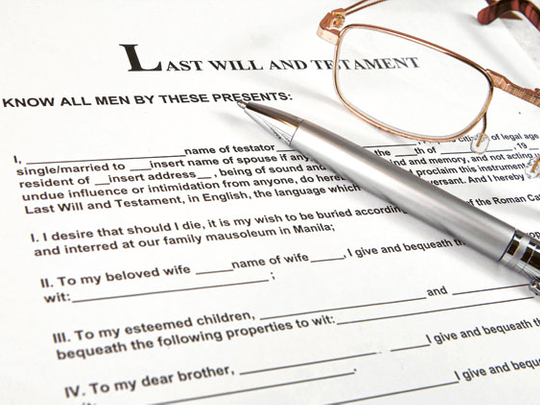
When was the last time you had a conversation about sorting out your will and last testament? Oh right, I forgot – you are still young and in no hurry to die. Who needs a will unless you are about to retire?
You are not alone in thinking this way. Over the years that I’ve been advising people, I’ve noticed a shocking lack of information about succession planning and its laws in this country. I think it is more than necessary that you understand the law of the land and why you need to sort your will and last testament now.
This month, I’ve chosen to answer a few questions that people have asked me over the years in Dubai. Hopefully this will give you some perspective on the importance of succession planning.
First things first. It is important for an expatriate to have a will in this country if you want your assets to be distributed in accordance with your wishes. In the absence of such a document – if you die intestate – Shariah law will be applied to distribute your assets.
The first thing that happens when someone dies is that any accounts bearing his name, whether they are held jointly or individually, will freeze immediately.
This is done to ensure that the deceased has not died in debt. Once all the debt has been settled, the remains of the estate are distributed using the principles of Shariah law. In this case the wife is entitled to one eighth of the husband’s estate, each parent is entitled to one sixth of the estate. Of the remainder, the sons receive two shares and the daughters receive one share.
It is always recommended that one does not hold joint accounts in the UAE as the concept of ‘either or survivor’ does not exist as is the case in some other parts of the world. Holding all your funds in dirham-denominated, UAE-domiciled accounts is not the safest bet. Most expats keep money needed for emergencies here and the rest is usually transferred to offshore accounts.
When an expatriate passes away, his residence visa is cancelled immediately. The family, if sponsored by the deceased, will have 30 days to exit the country as their visas will also be cancelled. Needless to say, trying to fight a succession case in that period of time is nearly impossible.
It is very important that if you hold any assets here – be they property, bank accounts, end of service benefits – that you have a valid will drafted, notarised and translated in the UAE and registered with the courts for it to be legally acceptable.
It is also very prudent to hold offshore life insurance policies to pay out to survivors and your dependents into accounts of their choice anywhere in the world. Usually on submission of all necessary documentation, the insurance companies take between 20-30 days to pay the dependents. This will take care of the family’s financial needs until the succession verdict is out.
I know this is an uncomfortable topic of conversation at the dinner table, but it is a discussion you need to have. We tend to think of tragedies as something that happen to other people. It’s only when tragedy strikes closer to home that most of us understand the gravity of the situation. Don’t leave it too late.
If you need some professional advice on this matter the people to call are: Devanand Mahadeva at Lasting Legacy. Call 04-326-6683 or 050-532-3810 or reach him via email deva@dm-mc.com. You can also contact Just Wills. Call 04- 311-6592 or by email online@just-wills.net
Rickson D’Souza is the director of wealth management at Pinnacle Insurance Brokers, Dubai. He can be reached on 04-346-888 or rickson@pinnacle-uae.com
Rickson D’souza is a member of the Top of the Table at the Million Dollar Roundtable. This basically means he is among the top 1 per cent of financial advisers in the world.











